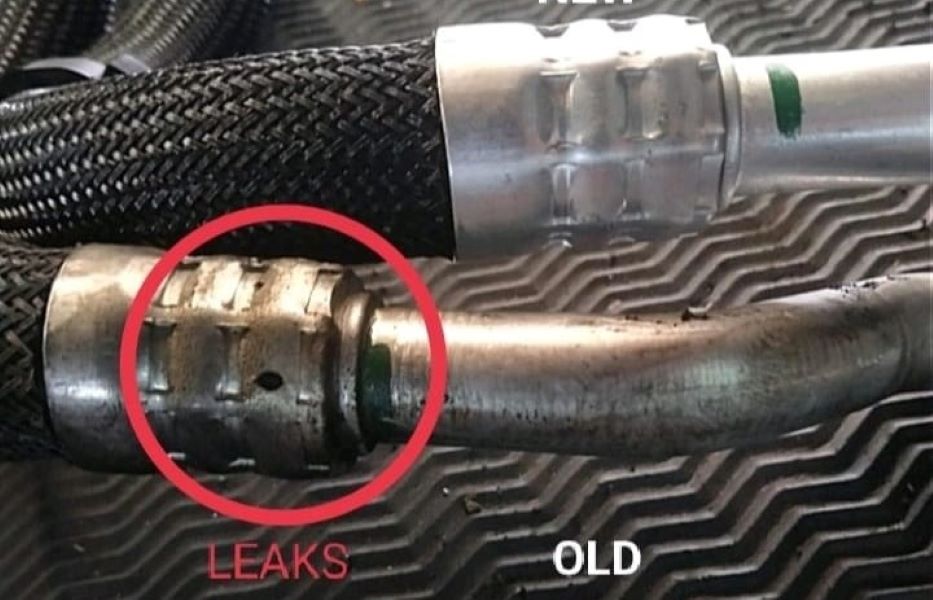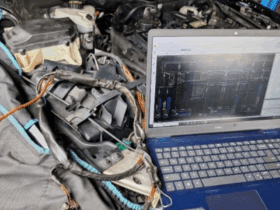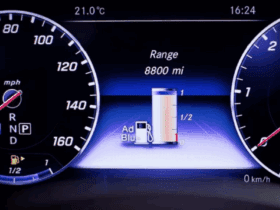Table of Contents
Resolving the Hissing Sound from Car AC in Mercedes-Maybach S680 (W223)
Few things disrupt a luxury drive like an unusual noise from the air conditioning system. One such symptom is a hissing sound from car AC, often heard from the dashboard when the system is turned on. While some drivers may ignore it at first, this noise often signals an underlying fault that can affect comfort and long-term system health.
In this case study, we’ll walk through the diagnosis and repair of a hissing sound from the AC in a Mercedes-Maybach S680 (W223). You’ll learn why this issue occurs, how technicians identify it, and the steps required to fix it, along with preventative measures to avoid future problems.

Vehicle Overview: Mercedes-Maybach S680 (W223)
The Mercedes-Maybach S680 (W223) is a flagship luxury sedan that combines cutting-edge engineering with unmatched passenger comfort. Equipped with advanced THERMOTRONIC climate control, it ensures consistent cooling across multiple zones. Any AC malfunction in this model doesn’t just reduce comfort it undermines the luxury experience the vehicle is built to deliver.

Customer Complaint: Hissing Sound from Car AC
- – Symptom: A noticeable hissing noise from the dashboard whenever the AC was turned on.
- – Customer Concern: The noise raised worries about refrigerant leaks, reduced cooling efficiency, and possible long-term damage.
Hissing sounds in AC systems typically indicate low refrigerant pressure, restricted flow, or escaping gas through a leak.
Diagnostic Process
Step 1: Climate Control Check with XENTRY
- – Process: Connected the XENTRY scanner tool to analyze actual values of the climate control system.
- – Findings: Refrigerant pressure was below the required standard, suggesting insufficient refrigerant or a leak.
Step 2: Refrigerant Circuit Test
- – Process: Used the scanner to perform a refrigerant circuit evaluation.
- – Results: Test indicated that refrigerant recovery was necessary to measure actual levels against manufacturer specifications.
Step 3: Refrigerant Extraction
- – Process: Extracted refrigerant from the AC system to measure its quantity.
- – Outcome: Levels were below specification, confirming a refrigerant shortage as the cause of the noise.

Step 4: Leak Detection
- – Process: Conducted a full leak inspection across hoses, compressor connections, and fittings.
- – Outcome: Leak identified at the low-pressure hose connected to the compressor. Escaping refrigerant created the hissing sound and lowered system efficiency.
Workshop Findings
- – Root Cause: Refrigerant leak at the low-pressure hose.
- – Effect: Loss of refrigerant pressure, reduced cooling performance, and audible hissing noise inside the cabin.

Rectification: Fixing the Hissing Sound
Step 1: Replace Faulty Component
- – The low-pressure hose was replaced with a genuine Mercedes-Benz part to ensure reliability and durability.
Step 2: Refrigerant Handling
- – Recovered remaining refrigerant.
- – Applied vacuum to remove air/moisture from the system.
- – Refilled refrigerant to the exact manufacturer-specified quantity.
Step 3: Post-Repair Testing
- – Conducted a system performance check.
- – Re-scanned with XENTRY: values were within spec.
- – Leak recheck confirmed no further refrigerant escape.
- – AC system produced consistent cold air without hissing noise.

Quick Reference Table – Case Summary
| Step | Action Taken | Finding | Result |
|---|---|---|---|
| Climate control check | XENTRY scan | Low refrigerant pressure | Leak suspected |
| Refrigerant circuit test | System evaluation | Required refrigerant recovery | Confirmed shortage |
| Refrigerant extraction | Recovered gas | Below-spec refrigerant | System undercharged |
| Leak detection | Full inspection | Leak at low-pressure hose | Root cause identified |
| Repair | Replaced hose + refilled refrigerant | Sealed system | AC cooling restored |
Explore More Mercedes AC and Climate Control Issues
For a deeper dive into all AC-related issues, visit our hub page: Mercedes AC and Climate Control Problems – Complete Troubleshooting Guide. You’ll find grouped case studies, step-by-step diagnostics, and prevention tips.
Why Does a Car AC Hiss?
| Cause | Explanation | Typical Symptom |
|---|---|---|
| Low refrigerant | Escaping refrigerant reduces pressure, creating hissing noise | Weak cooling + noise from vents |
| Hose or fitting leaks | Refrigerant escapes under pressure | Continuous hiss until gas depletes |
| Expansion valve noise | Refrigerant expands too quickly | Short bursts of hissing during operation |
| Internal blockage | Restricted refrigerant flow | Hiss + fluctuating cooling |
Preventative Maintenance Tips
- 1. Regular AC Inspections: Have refrigerant levels checked during routine service.
- 2. Early Leak Detection: Watch for early signs like hissing, weak cooling, or oily residue around hoses.
- 3. Use Genuine Parts: Always replace hoses and components with OEM Mercedes-Benz parts to avoid repeat failures.
- 4. Run AC Year-Round: Even in winter, running the AC occasionally keeps seals lubricated and prevents leaks.
- 5. Cabin Filter Replacement: Replace filters annually to maintain airflow and reduce strain on the system.
FAQs – Hissing Sound from Car AC
Q1. Is a hissing sound from car AC always a refrigerant leak?
Not always. It may also come from the expansion valve or restricted flow. However, a consistent hissing with weak cooling usually points to a leak.
Q2. Can I keep driving if my AC hisses?
Yes, but prolonged driving risks losing all refrigerant, which may damage the compressor. It’s best to get it inspected quickly.
Q3. How much does it cost to fix an AC leak in a Mercedes-Maybach S680?
- – Low-pressure hose replacement: $500–$900
- – Full refrigerant recharge: $200–$400
- – Costs vary depending on labor and regional pricing.
Q4. Will recharging refrigerant alone fix the hissing?
No. Without sealing the leak, refrigerant will escape again, and the noise will return.
Q5. How often should I service my Mercedes AC system?
Mercedes recommends every 2 years, including refrigerant checks and leak inspections.
Conclusion
The hissing sound from car AC in this Mercedes-Maybach S680 (W223) was traced to a refrigerant leak at the low-pressure hose. By systematically diagnosing the system with XENTRY, performing leak detection, and replacing the faulty component, technicians successfully restored cooling performance and eliminated the noise.
For owners of luxury vehicles like the S-Class or Maybach, the lesson is clear:
- – Never ignore unusual AC noises.
- – Prompt inspection prevents larger failures.
- – Regular AC servicing ensures lasting comfort and efficiency.
By addressing issues early, you protect both the comfort of your passengers and the longevity of your Mercedes-Benz air conditioning system.
Author
Written by: Mercedes Expert
Automotive Technical Trainer & Mercedes-Benz Diagnostic Specialist
With years of hands-on experience repairing and diagnosing Mercedes-Benz vehicles, specializes in case-study-based troubleshooting guides that blend workshop accuracy with educational clarity.
Last Updated: September 2025






Leave a Reply